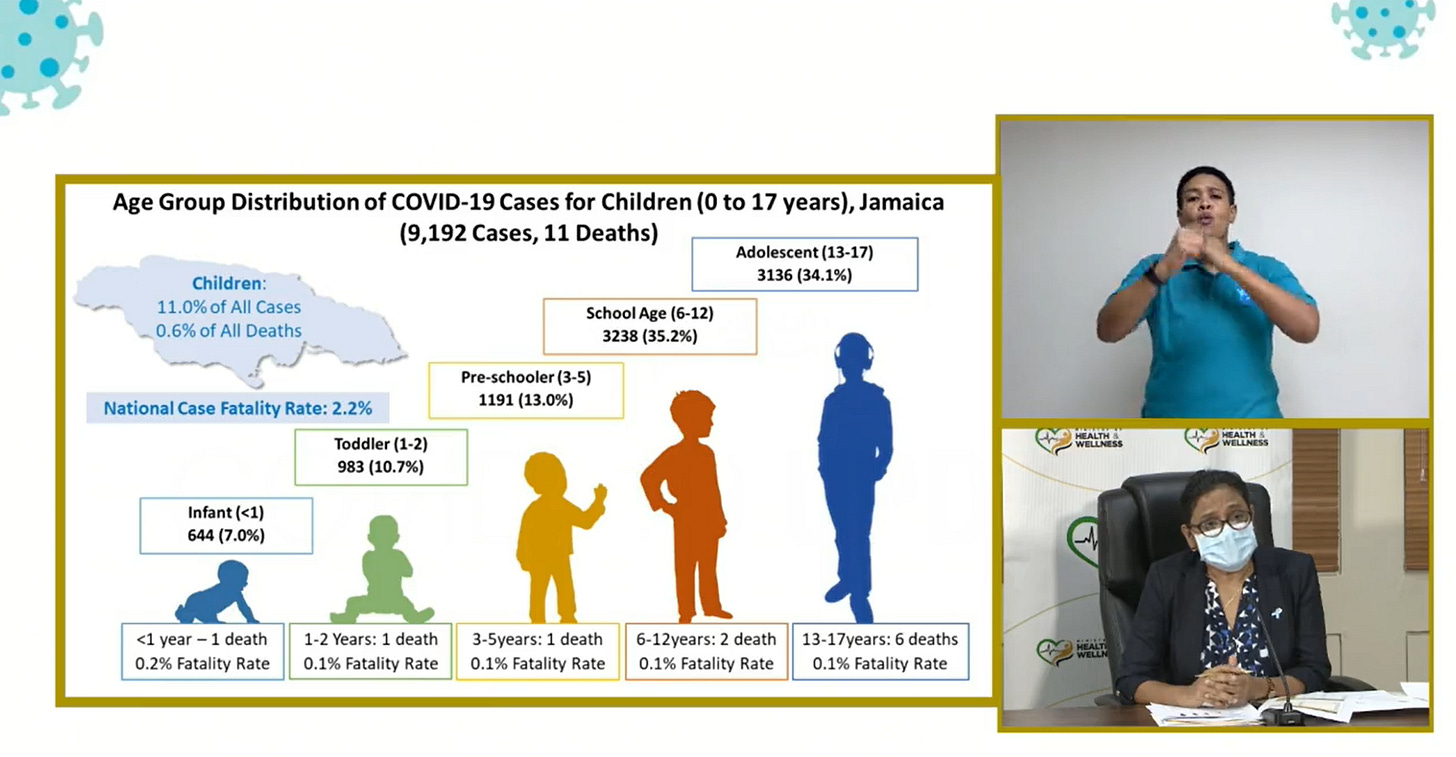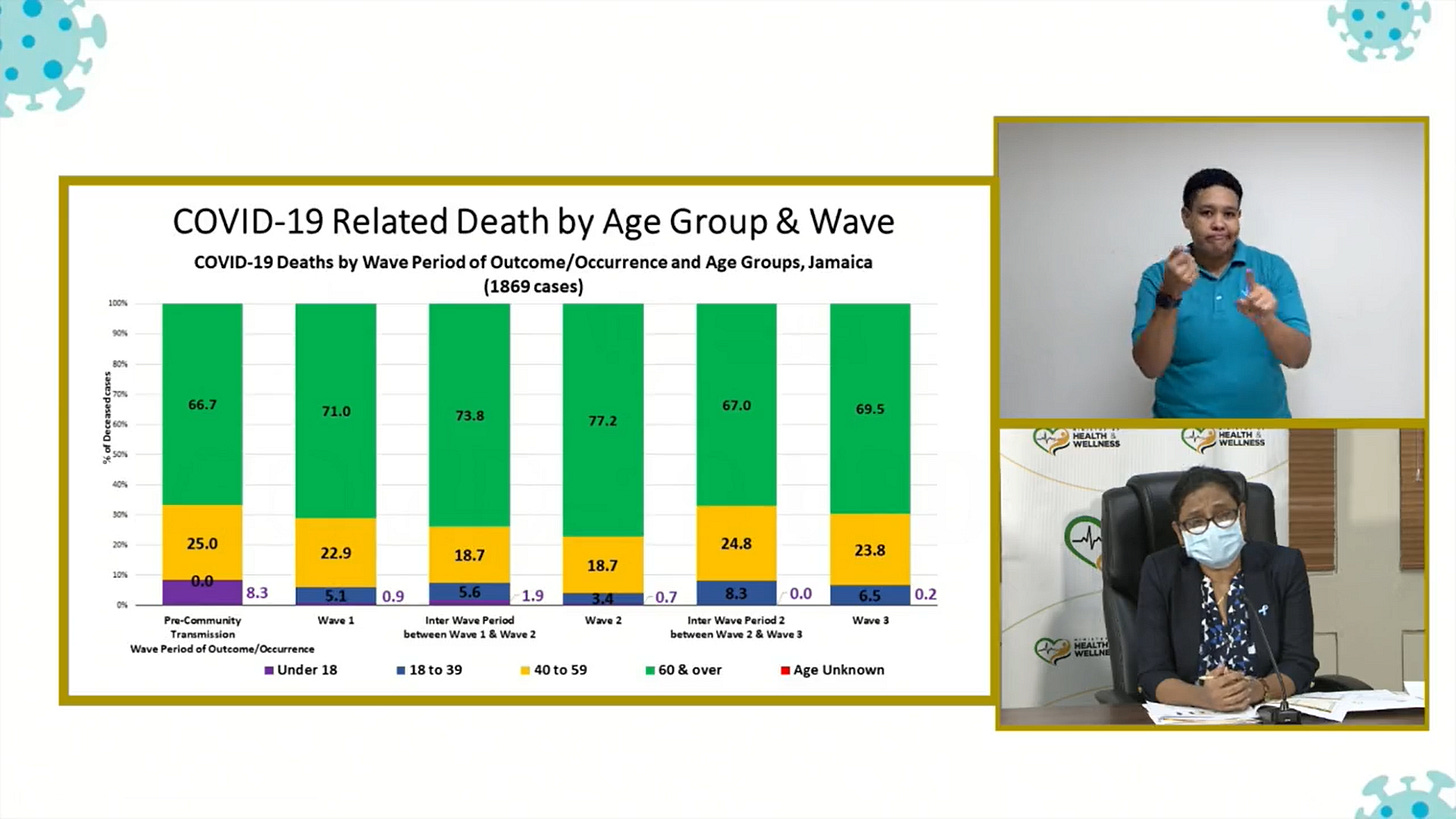FREE ACCESS: Three Children in Jamaica Were Hospitalized and Released After Taking the Covid Vaccine
Some readers have asked me if by doing these stories on post-vaccination safety surveillance I’m contributing to vaccine hesitancy.
It’s possible.
But my intention is to contribute to informed decision-making, both at the individual and macro level as governments and companies around the world contemplate mandatory vaccination policies.
It’s also important to hold government to account when they don’t fully report on vaccine adverse happenings. Timely and transparent communication on vaccine safety is recommended by the World Health Organizaton (WHO), which says, “lack of honesty and withholding information can erode trust.” In fact, withholding information could arguably contribute to vaccine hesitancy.
In keeping with our commitment a few months ago, 18º North is making posts on vaccination safety surveillance free after first fulfilling our commitment to our paid subscribers.
You can help 18º North expand its capacity to do this kind of journalism with a paid subscription. The cost is US$11.50 a month or US$115 a year, with sales tax included. If you can afford it, please do consider becoming a paid subscriber.
Three children in Jamaica were hospitalized for observation and released after taking the Pfizer-BioNTech Covid-19 vaccine.
The children, who range in age from 12 to 17, were hospitalized for 24 to 48 hours, according to Dr. Melody Ennis, Director of Family Health Services at the Ministry of Health & Wellness. Dr. Ennis is overseeing the country’s vaccination program.

“They have all resolved from the symptoms that they displayed and are well at this time,” Dr. Ennis said at a virtual press conference on Thursday.
*When asked about the specific symptoms of the children in a follow-up interview with 18º North, Dr. Ennis said that she would not be disclosing that information since, with only three having been hospitalized, “they can be easily identified.”
She did rule out myocarditis and pericarditis, two heart conditions that, in rare cases, have been associated with the Pfizer vaccine, especially in male adolescents and young adults. She explained that while young boys in Jamaica are seeing more side effects related to that brand, so far she hasn’t seen any of these two ailments due to the vaccine.

Jamaica’s health ministry began making the Pfizer vaccine available to those 12 and over in August, and the education ministry has said that 65% of a secondary school’s population must be vaccinated before in-person classes can resume.
As of October 1, the country had administered close to 71 thousand vaccines to the 12 to 17 age group. That number jumps to just over 80 thousand if you include 18 year-olds. About 27,800 young persons in this group are fully vaccinated, according to the health ministry’s internal vaccination dashboard that was shared with 18º North. The education ministry has said that it is targeting about 200 thousand high school students, which includes 18 year-olds.
At the time of our interview, Dr. Ennis said that she didn’t have to hand the number of adverse events reported by children. However, on Thursday she relayed that, “to date”, there had been a total of 353 such reports across all age groups with 72 considered serious. This compares to the 249 reports with 46 serious events that she outlined at a separate press conference on July 29.
Back then, she had said 305 thousand doses of the vaccines had been administered. On Thursday, the ministry stated that that number had increased to more than 780 thousand. (During a phone conversation over the weekend, Dr. Ennis said she didn’t have to hand the exact date of the adverse-event report from which she was pulling information. As a result, the exact number of doses for that date could not be ascertained.)
However, despite this increase in administered doses of more than 150%, Dr. Ennis revealed on Thursday that the number of post-vaccination deaths had remained at eleven.
She reiterated that nine of those deaths were considered coincidental, meaning they were not caused by the vaccine. Two were “indeterminate.” Indeterminate temporal means that “while they occurred after the persons were vaccinated, there is no established link to their vaccination,” according to a Ministry of Health release.
Among the reports of adverse events, pyrexia (fever), dizziness and headache were common, according to data shared by the ministry. Dr. Ennis said children were more likely to complain about some of the expected side effects like dizziness, flu-like symptoms and sore arms after receiving the injection.
The three children hospitalized after the Covid-19 vaccine compare to data released by the health ministry on Thursday showing that 79 had been admitted to hospital with moderate, severe or critical illness from Covid-19 since the onset of the virus in Jamaica in March 2020.

The ministry stated there had been 11 deaths among children from Covid-19, representing 0.6% of all fatalities in the country. It added that all of those children, except two, had co-morbidities that would have made them more susceptible to severe illness.

The eleven that died from Covid represents 0.1% of the 9,192 positive cases among the 0 to 17 year olds.
Children under 18 represented a higher percentage of positive cases in the later parts of the pandemic compared to the initial stages.
However, despite this higher incidence of disease among children, the ministry stated that it has only seen one Covid death in the young in the latest wave. Most of the deaths in this age group occurred in the earlier stages of the pandemic.

####
Editor’s Note:
*This holding back of information about the children’s symptoms by Dr. Ennis appears at odds with the WHO’s Safety Surveillance Manual on Covid-19 vaccines, which, on communication with the public, recommends that countries, “Be open and transparent about vaccine safety by providing access to all information, not withholding any, even when the facts are yet to be fully established…Lack of honesty and withholding information can erode trust.”
When asked previously by 18º North about Jamaica choosing not to share information publicly on individual cases, Helen Petousis-Harris, a former WHO adviser on vaccine safety and co-head of the Global Vaccine Data Network in New Zealand, a multi-nation research network that recently embarked on a study of 300 million to assess the safety of Covid-19 vaccines, wrote via email, “This is normal not to share individual level data, especially in small populations. This would not be acceptable in NZ.”
Like Jamaica, New Zealand has a small population of about five million. Jamaica’s is just under three million people.
Support the work that we do. Consider taking out a paid subscription:
Related Stories:
Jamaica's Health Ministry Finally Reports More Post-Vaccination Deaths. Now Eleven, Up From One.
Part 2: Jamaica Lagging Behind International Standard for Reporting Post-Vaccine Deaths

